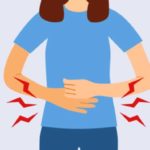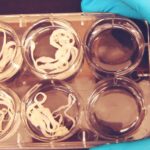How to treat diarrhea?
The sudden onset of 3 or more loose stools per day is called acute diarrhea. An imbalance in the physiology of the small and large intestines involved in the absorption of organic substances, ions, and water is the reason for the increased water content in the stools. Acute diarrhea can also be called acute gastroenteritis in some places. This is strange because the term gastroenteritis points out inflammation of both the stomach and the small intestines. However, acute diarrhea rarely involves the stomach and there are some diarrhea syndromes that do not cause small intestine inflammation.
Types of diarrhea
Normally in the digestive tract, there is a net absorptive state of electrolytes and water as compared to secretion. In diarrhea, there is a reversal of this. There are 2 major types of this condition: osmotic and secretory.
In osmotic diarrhea, there is an osmotic force in the lumen of the digestive tract created by substances that cannot be absorbed. Because of this, water moves into the lumen of the tract – into the area of higher concentration – to maintain balance. This type of diarrhea is observed in lactose-intolerant people or after ingestion of non-absorbable sugars like lactulose. The stool output is proportional to the amount of unabsorbable substance taken and is usually not so massive. Upon stopping the intake of the offending substance or upon fasting, watery stools regress as well.
In secretory diarrhea, an active secretory state is induced in the cells of the intestine. This is usually caused by bacterial infection of the gut-producing enterotoxins. These are toxins that alter the cell pathways resulting in increased secretion. Secretory diarrhea has increased the frequency of passing loose stools and a lack of response to fasting, as compared to osmotic diarrhea.
Causes of diarrhea
Diarrhea can be caused by a problem in the small or in the large intestine. The appearance, volume, frequency, and consistency of the stools can give a clue where the problem is. If the pathology is in the small intestines, the stool is watery, with a large volume and increased frequency of passing of stools. On the contrary, the stool is mucoid and/or grossly bloody, with smaller volume and highly increased frequency if the problem is in the large intestine.
- Ingestion of contaminated or raw food is one of the usual causes of infectious diarrhea. The common ones are Salmonella from eggs, dairy food, and meats and E. Coli from ground beef. Other foods that people should watch out for are poultry, pork, seafood, and oysters.
- Water exposure can also contribute to diarrhea since water is a major reservoir for causative organisms. Swimming pools and contaminated flood water are things you should be careful with.
- History of travel can give a clue towards the cause of diarrhea since there are organisms that are prevalent in certain parts of the world. Exposure to young dogs or cats and to turtles can contribute to diarrhea as well.
- Causes of acute diarrhea may be due to infections, drug-induced, food allergies or intolerances, disorders of digestion or malabsorption, chemotherapy or radiation-induced, surgical conditions, vitamin deficiencies or toxicities, ingestions of heavy metals, or toxins, and ingestion of certain plants. The causative organisms of diarrhea may be viruses, bacteria, as well as parasites.
Persistent or severe diarrhea can lead to unwanted complications like dehydration, which is the main cause of morbidity and death. Restlessness, sunken eyeballs, absence of tears, dry mouth, thirst, and poor skin turgor are signs of moderate dehydration. Dehydration has a spectrum from mild to severe and it is best when it is managed at the soonest time possible.
How to treat diarrhea?
Treatment of diarrhea is mainly supportive. Fluid and electrolyte replacement is very important for dehydrated patients. However, this should not be overdone because the patient might get congested. Fluid and electrolyte replacement comes in the form of oral rehydration solution, salted drinks, rice water, yogurt, vegetable or chicken soup with salt. Soft drinks and sweetened tea should be avoided. Intake of banana and apple can help. The substance that could have caused diarrhea should be discontinued in the case of osmotic diarrhea. Empiric antibiotics can be given to patients with severe community-acquired diarrhea. Anti-diarrheal agents such as loperamide can be taken to decrease intestinal motility. This is taken as an immediate measure for those who have something important to attend to but is not considered definitive treatment since the toxins may still be present inside the body.
Acute diarrhea can be managed at home but once signs and symptoms of dehydration become evident, it is best to consult a doctor or bring the patient to the nearest hospital or emergency room.




























